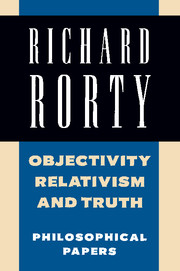Book contents
- Frontmatter
- Contents
- Acknowledgments
- Introduction: Antirepresentationalism, ethnocentrism, and liberalism
- Part I
- Solidarity or objectivity?
- Science as solidarity
- Is natural science a natural kind?
- Pragmatism without method
- Texts and lumps
- Inquiry as recontextualization: An anti-dualist account of interpretation
- Part II
- PART III
- Index of names
Is natural science a natural kind?
Published online by Cambridge University Press: 05 June 2012
- Frontmatter
- Contents
- Acknowledgments
- Introduction: Antirepresentationalism, ethnocentrism, and liberalism
- Part I
- Solidarity or objectivity?
- Science as solidarity
- Is natural science a natural kind?
- Pragmatism without method
- Texts and lumps
- Inquiry as recontextualization: An anti-dualist account of interpretation
- Part II
- PART III
- Index of names
Summary
Introduction
One of the principal reasons for the development of a subarea within philosophy called “philosophy of science” was the belief that ‘science’ (or, at least, ‘natural science’) named a natural kind, an area of culture which could be demarcated by one or both of two features: a special method, or a special relation to reality. The further suggestion, implicit in Carnap's work and made explicit by Quine, that “philosophy of science is philosophy enough,” was a natural extension of this belief. For just as Plato was content to leave the world of appearances to the philodoxers, so many of the logical empiricists were, implicitly or explicitly, content to leave the rest of culture to itself. On their view, once the job of demarcation had been accomplished, once the distinctive nature of science had been accurately described, there was no need to say much about the other activities of human beings. For, since man was a rational animal and science the acme of rationality, science was the paradigmatic human activity. What little there was to say about other areas of culture amounted to a wistful hope that some of them (e.g., philosophy) might themselves become more “scientific.”
Hempel and others, however, showed that demarcation was not as easy as it had first appeared. The increasing plausibility of Neurathian holism, once it had been revivified by Quine's “Two Dogmas” and by Wittgenstein's Philosophical Investigations, further undermined attempts to isolate “the scientific method,” because it undermined attempts to isolate piecemeal connections between scientific theories and the world.
- Type
- Chapter
- Information
- Objectivity, Relativism, and TruthPhilosophical Papers, pp. 46 - 62Publisher: Cambridge University PressPrint publication year: 1990
- 3
- Cited by



